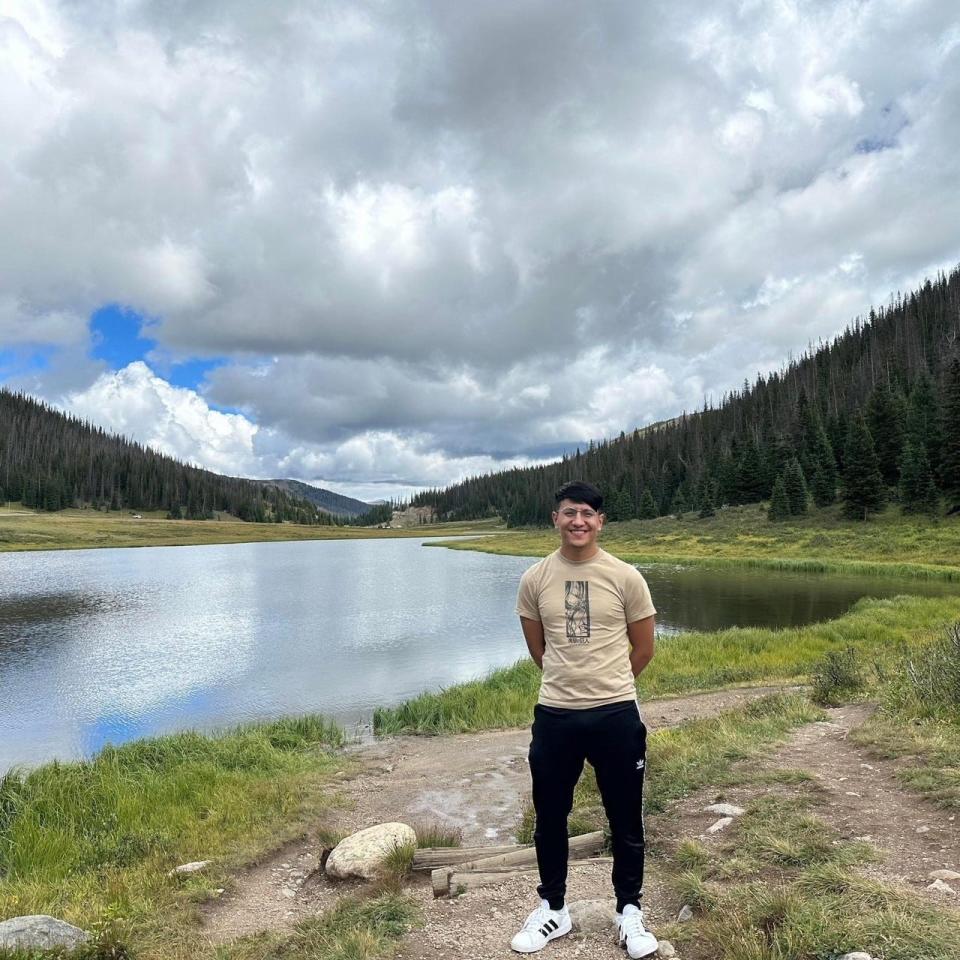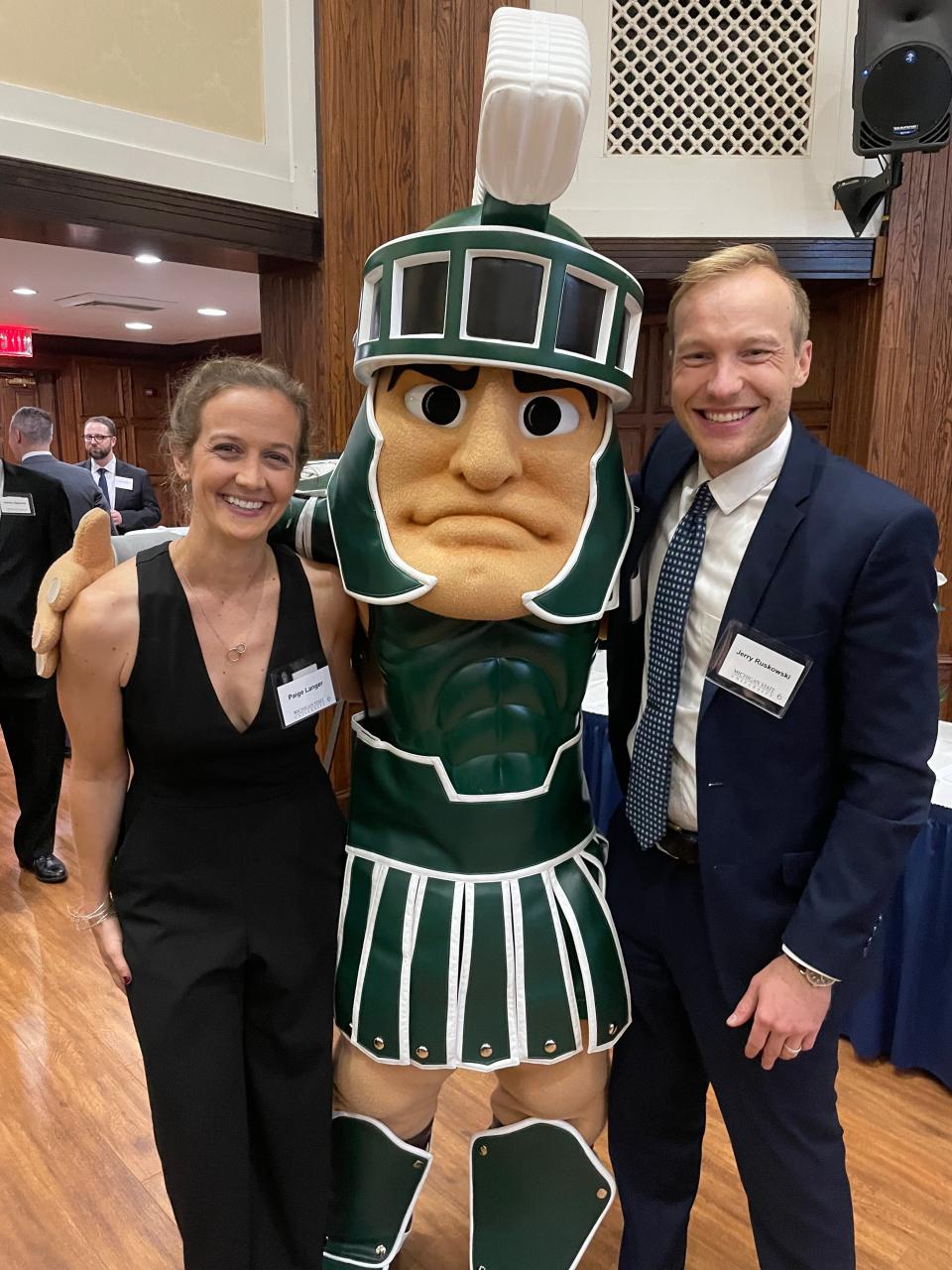Beaches, affordable housing, politics: What made these 8 people move to Michigan
- Oops!Something went wrong.Please try again later.
In Michigan, state leaders are hoping to solve a problem that could have wide-ranging effects on its future —the recent decline of the state population.
Since 2020, the last time the once-in-a-decade U.S. Census count occurred, Michigan’s population has lost about 40,000 people, census estimates show. Although the census found Michigan grew in population from 2010 to 2020, that growth still came at a snail’s pace. Is that too harsh of a description? Numbers say no, Michigan’s population growth ranked second to last among states that gained population over the decade.
The sluggish growth and recent decline of Michigan's population pose problems for the state, from the loss of electoral votes and congressional seats to putting a damper on the state’s economic outlook.
“The state needs to elevate the idea of retaining and attracting people to be as important as the idea of retaining and attracting jobs,” said economist Don Grimes, the regional economic specialist at the University of Michigan’s Research Seminar in Quantitative Economics.
“The primary reason for that is you can't have jobs if you don't have the people to fill them up. And we basically are running out of people to fill jobs. Unless the population trend changes in a positive direction, firms are going to find it very difficult to hire people for a long time.”
Elected officials recognize the potential dangers posed by a stagnant population — in June, Gov. Gretchen Whitmer announced the creation of the Growing Michigan Together Council, a bipartisan group tasked with offering policy solutions to grow Michigan’s population.
"We all know that where someone chooses to make their lives is the most important vote of confidence," Whitmer said, during the announcement on Mackinac Island.
While recent population trends in Michigan haven’t played out ideally for economists and government officials, there are still people moving to Michigan. The Free Press set out to learn from people who had moved to Michigan in the last several years. What attracted them here? What could Michigan do to attract more people? What trade-offs did they make to live in the Great Lakes state?
These Michigan movers pointed to a variety of things the state has to offer, including its Great Lakes and other natural resources, relatively low cost of living and variety of amenities. Here are some of their stories:
Detroit a perfect place to have an impactful career
Naim Edwards, 36, currently works as the director of the MSU Detroit Partnership in Food, Learning and Innovation. Before moving to Detroit in 2014, Edwards said his outlook on his career goals were shaped by his experiences in Ecuador as a member of the Peace Corps.
“Despite my intentions to do or have a positive impact, I was appropriately recognized as a person who was foreign, a person of a different culture,” said Edwards, who is originally from Harrisburg, Pennsylvania, and attended Morehouse College in Atlanta. “As welcome and as hospitable as Ecuadorians were to me, there was a clear divide and kind of barrier between my ability to really connect and be grounded in the communities that I served.”

Following his time in the Peace Corps, Edwards began postgraduate studies at the University of Michigan, focusing on managing urban gardens to support biodiversity. Edwards, who is Black, said Detroit was an ideal city to both work in the urban agriculture movement and connect with other members of the community.
“It seemed like a really convenient fit for my career goals and life goals,” he said.
Edwards also pointed to Michigan’s natural resources and amenities as strong traits making the state a great place to live. Still, he recognized one stark contrast Detroit has with other major cities — a lack of accessible public transportation connecting neighborhoods and communities.
“I always look at the amount of money that's put into expanding and restoring our highway system … just within the city of Detroit, I wonder if that money was simply put toward more buses, a light rail system that ran along Michigan Avenue, Grand River, Gratiot and Jefferson or something like that,” he said, noting that more often than not, long-distance travel in Michigan is only possible with a car.
Still, Edwards described Detroit as a great place to live.
“I'm just really grateful to live here. Proud to live here in a lot of ways.”
Lansing woman appreciates Michigan seasons, politics
Rita Bunton, 74, of Lansing, moved out of state to get medical treatment for her husband and be near her daughter in North Carolina. She lived there from 2014-18 and loved the Southern hospitality but didn’t love the homesickness and long drives to a medical center.

Her husband, Peter Bunton, used to drive her everywhere. But as his condition deteriorated, she became the driver. The dark roads and long trek wore her out, but she could never get transportation assistance, despite filling out multiple rounds of paperwork. Plus, “it just did not feel like home to me,” she said of North Carolina.
When the couple moved back to Michigan, she was able to set up transportation assistance with the Capital Area Transportation Authority’s paratransit program without any headaches.
“Everything we needed, we got back here and was set up within a few months. And we had been down there for four years,” Bunton said.
Her husband died in 2020, but she has family and friends in the area. The biggest selling point, to her, is the four distinct seasons. She’s an autumn person and she’s already looking forward to it this year.
But she also appreciates the state's political leadership, including Gov. Gretchen Whitmer, Attorney General Dana Nessel, Secretary of State Jocelyn Benson and Lt. Gov. Garlin Gilchrist II.
“We’ve got some really strong leaders here in Michigan. That’s why I’m not going anywhere else,” Bunton said.
She’s lived in 5 other states, but loves Lansing
Mallory Smith, 36, was born in Pennsylvania and lived in Maryland, New Jersey, Connecticut and Indiana before moving here for a unique job: She works as a physicist at Michigan State University’s Facility for Rare Isotope Beams.
She knew she’d love the job, but it was a bonus to find she loved Lansing, too. She appreciates the good standard of living, vibrant communities, varied political discourse of a swing state and how welcoming people have been.
“I love the city of Lansing and the scale of it, and it’s just a fun place to live. … I would definitely choose it all over again,” Smith said.
And Michigan isn’t a monolith — she sees opportunities to choose your community in the state.
“You can live in Lansing and there’s so many different size towns and rural areas so you can really kind of live somewhere that suits you,” Smith said.
The biggest negatives, in her book, are some recent violence in the city and also winter: “It’s so cloudy, and nobody talks about it.”
She has moved around a lot but doesn’t plan to leave anytime soon.
Detroit’s potential a reason this Michigander returned from overseas
After graduating from high school in 2009, Rochester native Shirin Khan spent much of her adult life outside Michigan — first attending college in Chicago, then pursuing graduate studies in California, later working in Washington D.C. and finally spending two years living outside the U.S. in Abu Dhabi in the United Arab Emirates.
But when the coronavirus pandemic hit in 2020, Khan, 32, decided it was time to return home, first moving in with family in Ann Arbor that December and then to Detroit the following June. Working and living in Detroit has been a strong reminder of the city’s post-bankruptcy growth, Khan said.
“I think it's an awesome city. I see a lot of room for potential and for growth and I'm excited to see where it goes,” Khan said. “I'm only about 40 minutes away from my parents, so for me a big draw was being able to live in the city.”

Khan pointed to other factors making Michigan a destination for her — the state’s many lakes and beaches, its four seasons — and new policies enacted by Democratic legislative majorities and Whitmer.
“I'm really loving ... how welcoming we are trying to be to everyone who wants to come, and I am of the opinion that Michigan will be a haven for people who are experiencing climate change-related issues in the future,” she said.
After Whitmer signed bills passed by lawmakers codifying civil rights protections for LGBTQ+ individuals and repealing defunct restrictions on abortion, Democratic leaders have pointed toward making the state a more welcoming one for all individuals as a priority.
The state still has areas it can improve, Khan said, particularly pointing out its infrastructure and public transportation — compared with Chicago and D.C., she said it’s unfathomable to live in Detroit without a car, adding “making it more accessible to get around would be a huge improvement.”
Natural beauty, job flexibility brought family home
Doug Anter, 57, left Michigan for Washington state in 2014 after Compuware restructured and eliminated his job. At the time, his family had young kids and mounting expenses. He took a job at Amazon in Seattle.
“To me, the decision to move made itself. I didn’t make it. Because I had to move. I had to buy diapers, I had to buy formula,” Anter said.

There were things he liked about Seattle, including the natural beauty and the community his family found, mostly through church. But there were trade-offs, too — Seattle had a high cost of living and traffic congestion, and drugs, crime and homelessness were persistent problems.
And every time they came to Michigan for vacation, it just felt right.
“I just always longed to come back. But again, the job market didn’t seem to support that,” Anter said.
But later down the line, Amazon instituted a work-from-anywhere policy for his team. In 2020, his family took his job back to Michigan, using the proceeds from their Seattle-area home sale for a sizable down payment on a house in Byron Center. It was a change from where they’d originally hailed from — Port Huron — but offered proximity to Lake Michigan and a bustling metropolitan area with cultural amenities like a symphony and museums.
“We could have moved anywhere … we chose Michigan over any other place on the globe. And I was ridiculed for it by some people,” he said, noting that some on the coasts think of Michigan as flyover country.
He’s working another remote job now and still enjoys living in Michigan. Now, his family is well-positioned to enjoy the state’s natural beauty. He’s a photographer and liked the Seattle area’s natural features too, but said, “Michigan is just so ridiculously beautiful.”
Living outside of Michigan made 1 man appreciate it
Milton Ramirez, 28, was born in Mexico but spent his formative years growing up in west Michigan. He and his wife left the state for West Virginia while she was in graduate school and then North Carolina for a job. But as soon as a Michigan-based career opportunity opened up for his wife, they were back.
“I don’t think I appreciated how much Michigan had to offer until I moved away and then moved back,” Ramirez said.

The couple landed in Waterford, and Ramirez, who works in human resources, said there were lots of job postings when he was looking.
The biggest upsides, to him, are the best summers he has seen in all of his travels and low cost of living, including a housing market that’s affordable. He said his friends who have moved out of state tend to rent, while many of his friends in Michigan own their homes.
The biggest drawbacks are traffic and the winter blues.
“People snowboard and ski and they find ways to deal with it, but it is a little depressing,” he said of the cold weather.
In general, he finds everything he wants in metro Detroit — including great food options — and says it’s usually a stop for big-name artists and comedians he and his wife go see. And while he doesn’t yet know whether his family will include kids, he thinks Michigan would be a fun place to raise them with access to lots of outdoor recreation.
He said Michigan has a lot to offer but sometimes flies under the radar.
Family ties bring Michigander back after decades away
Northville native Elma Rosenberg, 75, left Michigan in 1973, living in Wisconsin and Minnesota before moving to St. Petersburg, Florida, at the end of the '70s. Following her husband’s death, Rosenburg decided to move to Otsego to be closer to her sister and grandchildren.
“I thought, 'well, it’s getting time to decide what I want to do,' ” she said. “Do I stay in Florida and visit family, or do I live near family and visit Florida? And Florida is a lot easier place for me to visit.”
Beyond family ties, Rosenburg also pointed to rising costs in St. Petersburg that came with the city’s rising population in the decades she lived there. St. Petersburg, on the other side of the bay from Tampa, has grown about 4% in population since 2000, census data shows, and the greater Tampa Bay area has ballooned from 1.6 million residents in 1980 to nearly 3.2 million residents in the most recent census.
“When we moved to St. Petersburg, it was like an overgrown small town,” Rosenberg said. “It's become much more urban, much more developed and much more expensive.
“St. Petersburg is a delightful city, but it's become all high rises and condos and bars open until 2 a.m. And that wasn't particularly where I wanted to live. I like being more out in the country, in a smaller town atmosphere. And then St. Petersburg, as well as Florida in general, has just got enormously more expensive.”
Rosenberg has only been back for around six months, having wanted to experience Michigan’s spring. She’s unsure whether the state can count on others like her who move back to be closer to family, but noted Michigan’s natural resources could be a calling for many others, as well.
“I'm not sure what the state could do as far as selling itself, but I love it. For me, I enjoy being able to drive on country roads and I see farmland and beautiful woods and a lot of it is still relatively unspoiled,” she said. “It's not you know, it's not like wilderness but it's very pretty country to me.”
Coming back to Michigan was always in this Spartan’s mind
A deflated job market in 2011 sent Jerry Ruskowski, now 34, to Washington D.C. instead of staying in state. After graduating from Michigan State University the year before, Ruskowski had hoped to find work in his home state, but instead left for an opportunity working on Capitol Hill.
“I've always had an eye on jobs in Michigan, but I hadn't really thought about my skills from D.C. and policy would transfer back to positions in Michigan,” he said. “About a year ago, I decided I was going to start putting in more effort, and it took me a long time to find a position, but I just did this summer so I’m thrilled.”

Ruskowski and his wife are moving to metro Detroit and are currently in the midst of a house search. He couldn’t point to a single reason for wanting to return, but said wherever he has been, meeting another Michigander brings up common love of the Mitten State.
“I think people who grow up in Michigan have a have a weird, like spiritual connection to the state,” he said. Growing up near Traverse City, he has spent plenty of time admiring the state’s natural resources and since moving to Washington D.C., he has met other Michigan natives who feel the same.
“I served on the board for Michigan State alumni for the Washington D.C, area. And I connected with people who grew up in Michigan and they have like the same reaction,” he said. “They still count themselves as a Michigander, and they might not have lived there for 20, 30 years.”
Editor's note: This story is part of a series focused on presenting solutions for population loss, a big issue facing Michigan. In our next piece, we'll explore cities and regions with similar characteristics to Detroit and Michigan to see how they've boosted their populations.
Contact Arpan Lobo and Emily Lawler: alobo@freepress.com and elawler@freepress.com. Follow them on X (Twitter) @arpanlobo and @emilyjanelawler.
This article originally appeared on Detroit Free Press: Michigan population: People still move to state despite trends

